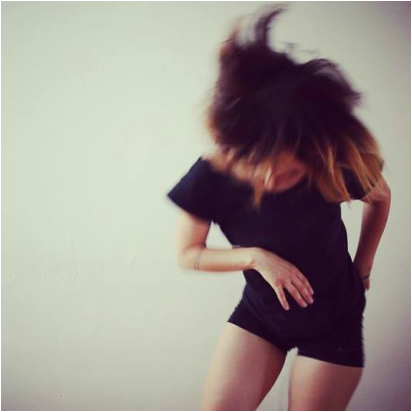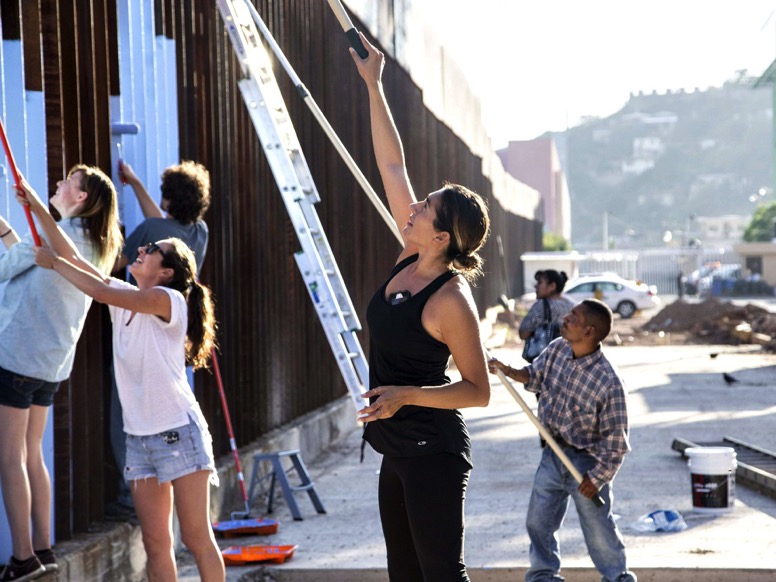|
Border/Arte's mission is to explore the relationship between art and politics. We asked each of our collective members to share the ways their artistic and/or cultural work grapples with social issues. This week we talked to Kate Saunders, now living in Mexico City, about these issues.  What are the themes of your artistic practices and why? The principle themes in my artistic practices are feminine identity, queer identity, home, border politics, and the desert. To me they are all connected and I especially find rich metaphor in the desert for almost every aspect of my storytelling. These themes are what I graze against or smash into in my everyday life. They are the politics that build my body and the walls around me, so I find that by unearthing them through creative work and cultural partnership we are able to learn (or unlearn) more deeply and fully about important aspects of our lives. I find that by moving through these themes we are more able to connect to memory and through sharing these stories we are able move ideas into models that better serve us. What is the role of art in shifting political awareness and creating a more equitable society? I believe that the role of art is to seek new ways of understanding; to share infinite histories, memory and perspectives; and to provide space for reflection and discussion, which I believe are all necessary actions for shifting ideas, political awareness, and fostering a more equitable society. How do you understand your work in the context of Border/Arte’s core values and mission? I am from Arizona and currently working away from home, [the distance] has made it more important for me to understand where I come from and how that is represented in my work. What are the stories we are telling about home? What does it mean to be from the borderlands? What politics have we inherited and what are the politics we embody? These are some of the questions I am exploring in my work and artistic/cultural partnerships.
0 Comments
As part of Border/Arte's Living Room Sessions series, we ask artists to share their thoughts on a broad range of personal and political topics. We asked Ana Teresa Fernández to share her feelings about home and vulnerability, and her thoughts on politics and art.
As a Mexican-born national living in the US, can you share how you move through these worlds. What is home for you? What are those places where you feel most vulnerable and open? Home is a space I am still trying to decipher. I feel most at home when I'm submerged in a conversation in Spanish in Mexico that has a level of wittiness and banter that is not translatable. I feel most at home when I'm free to roam in my activities in San Francisco and not have to explain or justify anything to anyone, moving from the water to my studio with ease. I feel most at home in the embrace of my mom and dad when I visit them in San Diego, CA. I feel most at home when I arrive to my small surf shack in San Francisco and can sit in my tiny kitchen and write, getting lost in some of the most absurd ideas, allowing myself to dream without any borders. These are the places where I feel at home, in conversations; expressing language, moving my body, provoking my mind. Home is not just one concrete place, but a series of moments that make up a notion of home. In these, I feel I can most be myself and reveal parts of me. What are the main themes of your artistic work and how do you approach them? The theme that most interests me is the relationship between Seen/Unseen. This becomes an umbrella for engagement in politics through immigration, gender divide, identity struggle. What usually gets me intrigued is when I come across information for the first time of an injustice that has been around for sometime, and I ask myself, "why hadn't I heard about this before? How long and why is it going on? And what can I do to change that or amplify the awareness of it?" Can you share your thoughts on the importance of art to make social and cultural change? This first step for me is to create an awareness. This I attempt to do not just with stats and figures, but by presenting the same problem in a new or different light, trying to engage or re-introduce an old conflict in a new way that is more approachable or engaging. This usually begins a conversation. Once you have a conversation and catch people's interest, this is when you mobilize change or action. People do not often realize that they themselves have agency to change what is around them. Often times there is the belief that change comes in monumental forms, but in reality, sometimes it is just the smallest of actions or involvement that can really "stir it up," as Mr. Marley says. You recently came to Arizona for a 10-day statewide residency, which garnered international attention. Can you talk about Arizona as a site for artistic and cultural work? What is unique and special about this state? That was my first time in Arizona. And what a place! Immense natural beauty, expansiveness... Yet at the same time there is a spectrum of extremes in people's cultural beliefs and approaches. Very liberal and open minded folks in the same pool as extreme right wing conservatives. It makes for very tricky waters. You get people with the willingness to create change, but you are met with harsh resistance. I feel California is much more like Switzerland, more laissez-faire, not much stirring, but not much opposition. I received a lot of love, but also a lot of hate in Arizona. There is a perception that working artists are secure and sure of their place. Can you share some aspects of yourself and work that feel insecure and are still growing? In other words, those aspects that need constant courage and daring to show themselves? This is the million dollar question. The notion of security is completely false. One thing I do know is that the landscape of the artist life is constantly in quick sand, and that is largely attributed to the lack of infrastructure placed in our culture to the arts in general. No Ministry of Culture exists! I always thought Quincy Jones would make an epic Minister of Culture. Or Minister of Cool. But in all seriousness, artists exist where often times there is no constant paycheck. This creates a bit of an Odysseus position, where you have to become ingenious and cunning as to how you move in the world , learning all sorts of societal languages to contort into something that will keep you afloat. This, coupled with the idea that we exist in a state of constant awareness and openness to take in the troubles of the world and create work that will speak about it in an expansive, and interesting way.... I mean it is like we are the sponge & the punching bag. But having said all this, it is a privileged position, because so many people never get asked for their opinion, so many people expand on notions of the "whys" of the world, we exist in a constant state of questioning and receptivity of thought and action, and this is a privileged position, to create a voice to create change, is one of the most unique and special places to be in. And for one to be able to do that, one must feel secure in their voice, in what they believe in, and that is sacred. How would you most like to grow artistically and personally this next year? Being more open, allowing myself to be more vulnerable and willing to change and adapt. Not to become someone else, for others, but to become more expansive with my practice of awareness and empathy with others. |
Banner photo by:
Carlos Antonio
|


 RSS Feed
RSS Feed